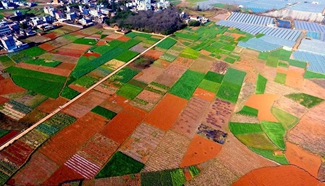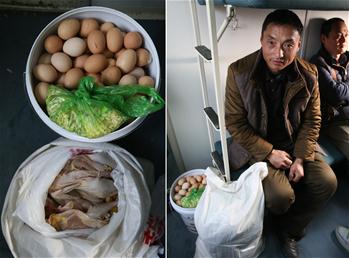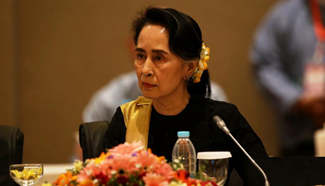
U.S. Defense Secretary James Mattis (L) attends a press conference with his Japanese counterpart Tomomi Inada in Tokyo, Japan, Feb. 4, 2017. (Xinhua/Ma Ping)
BEIJING, Feb. 6 (Xinhua) -- U.S. Defense Secretary James Mattis' reiteration of America's defense commitments to its allies in Asia during his maiden visit to the region over the weekend has added uncertainty to regional stability.
By reaffirming U.S. engagement, the new Pentagon chief's visit to South Korea and Japan seems to have raised more uncertainties in the Asia-Pacific instead of bringing stability as he claimed.
STABILIZER OR STIMULATOR?
During his three-day visit ending Saturday, Mattis offered most key security reassurances that Tokyo and Seoul, the two key U.S. allies in Asia, have long been eager to hear after remarks made by U.S. President Donald Trump in his campaign trail.
In a series of meetings with senior Japanese officials, Mattis reiterated his country's mutual defense commitment to Japan, saying that their alliance remained a "cornerstone" of regional stability.
Mattis's praise of Japan as "a model" of burden-sharing downplayed the accusation of "free-rider" on security that Trump made in his presidential campaign.
The hawkish former four-star general also claimed that the Diaoyu Islands, an inherent part of the Chinese territory, fell under Article 5 of the U.S.-Japan security treaty, a statement sparking criticism from China.
Chinese Foreign Ministry spokesman Lu Kang said later that the so-called U.S.-Japan treaty was a product of the Cold War, and should not impair China's territorial sovereignty and legitimate rights.
Talking to his South Korean counterpart earlier last week, Mattis reaffirmed the Trump administration's commitment to deploy the Terminal High Altitude Area Defense (THAAD), a high-end U.S. missile defense system nominally aiming at countering missile attack from the Democratic People's Republic of Korea.
Despite Trump's vowing days ago to take fresh look at the country's foreign policy, Mattis's remarks have been interpreted as an extension of the Obama administration's pivot-to-Asia strategy.
The main purpose of Mattis's visit is to reassure its allies about the U.S. continuous engagement in the region, said Diao Daming, a researcher on American studies at the Chinese Academy of Social Sciences.
"More U.S. military presence in the region could be expected," added Diao.
JAPAN'S AMBITION
After meeting with Mattis, Japanese Prime Minister Shinzo Abe said he was convinced that the United States and Japan could demonstrate to the world their "unwavering alliance."
Abe's remarks revealed Japan's willingness to boost bilateral ties and shoulder more military responsibilities, a move that can expand the country's defense capacity and make it a "normal" country again, said Diao.
The U.S. stance helps Japan go further to realize its ambition of becoming a political and military power on the global stage, said Zhu Jianrong, a professor in political studies at Toyo Gakuen University.
"It is really alarming," Zhu observed.
Meanwhile, Tokyo may still not feel at ease in spite of assurances offered by Mattis, as the new U.S. leader has been proved quite "unpredictable."
"There will always be concerns" that promises may be reversed by Trump, Kazuhiro Maeshima, a Sophia University professor, told Japanese media.
Related:
China urges U.S. to stop making wrong remarks on Diaoyu Islands
BEIJING, Feb. 3 (Xinhua) -- China on Friday urged the United States to stop making wrong remarks on the issue of the Diaoyu Islands sovereignty after U.S. defense secretary James Mattis reportedly said the U.S.-Japan mutual defense treaty applies to the islands. Full story
Japan PM, U.S. defense secretary discuss bilateral security alliance, reaffirm mutual defense treaty
TOKYO, Feb. 3 (Xinhua) -- U.S. President Donald Trump's defense secretary Jim Mattis reiterated his country's mutual defense commitment to Japan in a meeting with Japanese Prime Minister Shinzo Abe in Tokyo on Friday. Full story
TOKYO, Feb. 4 (Xinhua) -- U.S. Defense Secretary James Mattis wrapped up a two-day visit to Japan on Saturday, during which he reiterated his country's defense commitment to Japan and pledged to strengthen the U.S.-Japan alliance with his Japanese counterparts. Full story
Mattis confirmed by Senate as new U.S. defense secretary
WASHINGTON, Jan. 20 (Xinhua) -- James Mattis, U.S. President Donald Trump's pick for defense secretary, was easily confirmed by the Senate on Friday. Full story










